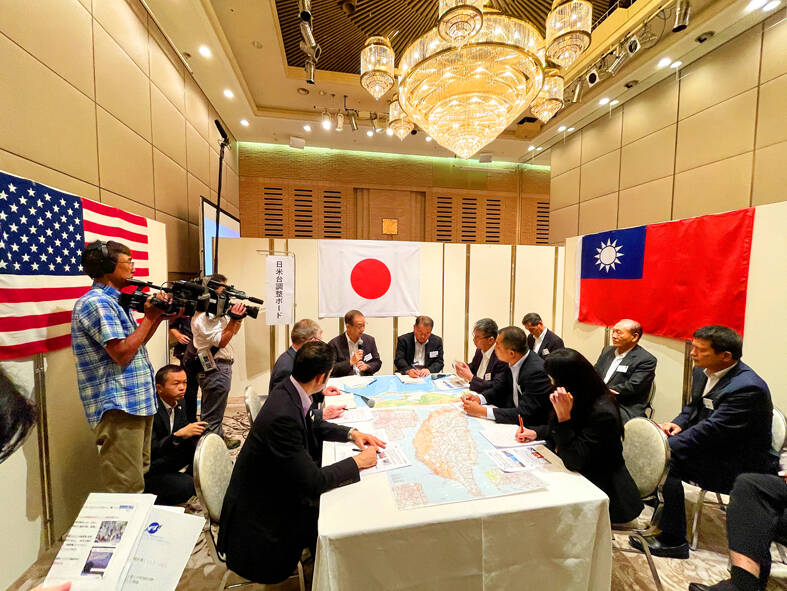Taiwan’s inclusion in a military simulation held on July 15 and 16 by the Japan Forum for Strategic Studies (JFSS) in Tokyo has significant implications for the nation’s role in regional security frameworks, retired air force lieutenant general Lee Ting-sheng (李廷盛) said on Tuesday.
The tabletop war game simulating a full-scale Chinese invasion of Taiwan featured the participation of analysts and retired high-ranking general officers from Taiwan, Japan and the US, said Lee, a participant and the deputy CEO of Institute for National Defense and Security Research (INDSR).
Last month’s event ended in a stalemate between the coalition of Taiwan, Japan and the US and attacking Chinese forces, which was the latest in a series of JFFS simulations rehearsing a war in the Taiwan Strait.

Photo: CNA
Being the most recent in a series of similar JFFS simulations, the event was also the first in the think tank’s history to include Taiwanese players.
The presence of Taiwanese experts and former officers — a first in the JFSS war game — has marked the nation’s entrance to the international arena, Lee said, adding that diplomatic personnel from Australia, Finland, Lithuania and the UK were present to observe the event.
Influence in Japan
Conclusions drawn from the war game would likely be worked into Tokyo’s policymaking, as a shuffle of the Japanese cabinet is expected in the second half of the year, he said.
Japanese House of Representatives member Itsunori Onodera and Kevin Maher, former director of the US Department of State’s Office of Japan Affairs, role-played the Japanese prime minister in the simulation, while Lai I-chung (賴怡忠) of Taipei-based Prospect Foundation role-played the Taiwanese president.
Eight retired general officers who served in the Japanese Self-Defense Forces took part in the simulation, exchanging views on the region’s strategic and economic situation with their Taiwanese counterparts, Lee said.
Lessons learnt
The potential for two nations’ distinct decision-making processes to cause coordination issues was highlighted in the exercise, INDSR assistant research fellow Yang Chang-jong (楊長蓉) said.
In addition, Taiwanese participants suggested their country could adopt the Japanese practice of incorporating international law considerations into strategic-level simulations, she said.
In the simulation, the Japanese government’s response to the conflict was calibrated by the legal requirements of the US-Japan Treaty of Mutual Cooperation and Security with regard to authorizing the use of US bases in Japan by Taiwan, she said.
The awareness of the roles the treaties could play in Tokyo’s military strategy was an important lesson, Yang said.

Taiwan has received more than US$70 million in royalties as of the end of last year from developing the F-16V jet as countries worldwide purchase or upgrade to this popular model, government and military officials said on Saturday. Taiwan funded the development of the F-16V jet and ended up the sole investor as other countries withdrew from the program. Now the F-16V is increasingly popular and countries must pay Taiwan a percentage in royalties when they purchase new F-16V aircraft or upgrade older F-16 models. The next five years are expected to be the peak for these royalties, with Taiwan potentially earning

STAY IN YOUR LANE: As the US and Israel attack Iran, the ministry has warned China not to overstep by including Taiwanese citizens in its evacuation orders The Ministry of Foreign Affairs (MOFA) yesterday rebuked a statement by China’s embassy in Israel that it would evacuate Taiwanese holders of Chinese travel documents from Israel amid the latter’s escalating conflict with Iran. Tensions have risen across the Middle East in the wake of US and Israeli airstrikes on Iran beginning Saturday. China subsequently issued an evacuation notice for its citizens. In a news release, the Chinese embassy in Israel said holders of “Taiwan compatriot permits (台胞證)” issued to Taiwanese nationals by Chinese authorities for travel to China — could register for evacuation to Egypt. In Taipei, the ministry yesterday said Taiwan

Taiwan is awaiting official notification from the US regarding the status of the Agreement on Reciprocal Trade (ART) after the US Supreme Court ruled US President Donald Trump's global tariffs unconstitutional. Speaking to reporters before a legislative hearing today, Premier Cho Jung-tai (卓榮泰) said that Taiwan's negotiation team remains focused on ensuring that the bilateral trade deal remains intact despite the legal challenge to Trump's tariff policy. "The US has pledged to notify its trade partners once the subsequent administrative and legal processes are finalized, and that certainly includes Taiwan," Cho said when asked about opposition parties’ doubts that the ART was

If China chose to invade Taiwan tomorrow, it would only have to sever three undersea fiber-optic cable clusters to cause a data blackout, Jason Hsu (許毓仁), a senior fellow at the Hudson Institute and former Chinese Nationalist Party (KMT) legislator, told a US security panel yesterday. In a Taiwan contingency, cable disruption would be one of the earliest preinvasion actions and the signal that escalation had begun, he said, adding that Taiwan’s current cable repair capabilities are insufficient. The US-China Economic and Security Review Commission (USCC) yesterday held a hearing on US-China Competition Under the Sea, with Hsu speaking on